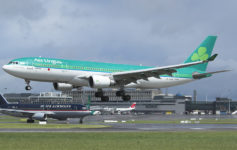Pittsburgh landed a charter service from Shanghai and it was objectively a resounding success. Will this lead to more charters or even regular service? Should it?
If you are considering booking travel or signing up for a new credit card please click here. Both support LiveAndLetsFly.com.
If you haven’t followed us on Facebook or Instagram, add us today.
History of the Charter
Allegheny Airport Authority CEO, Christina Cassotis has been relentless in improving the air service to Pittsburgh. Since she took over the post a few years ago she has all but moved Spirit from nearby Latrobe, Allegiant, Alaska and helped Frontier to expand. OneJet has utilized subsidies to set up a point-to-point operation flown by private jets departing from the terminal.
International traffic has been a focus of expansion. Service from WOW Air, Condor, expansion of Delta’s Paris service, and recently announced 4x weekly service from British Airways to London have added four international destinations to the map. Air Canada to Montreal and Toronto compliment Porter which flies to Toronto Billy Bishop. Qatar has added cargo service from a 777-200. However, putting Pittsburgh on the map for Chinese travelers has been one of her most significant accomplishments.
Cassotis has stated that she believes that “charter to scheduled service” is a replicable model and one she hopes will link China and Pittsburgh in the future. More than $750,000 in subsidies have ensured the flight would operate twice this season from Pittsburgh to Shanghai on a China Eastern 777-300ER.

Inbound Charter Lands Nearly Full
Reports stated that over 300 visitors arrived on the wide-body jet with 316 seats, a load factor north of 95%. While there is no statement as to how many of those tickets were paid as opposed to comps for tourism authorities, the charter should be seen as a success. There were just two returns operated, August 3rd and 11th from Shanghai Pudong to Pittsburgh International Airport all of which are available on the GDS and through a Chinese tour operator.
When the flight and dates were announced, it seemed clear to me that the flight could be a success based on the timing alone. Carnegie-Mellon University, Pitt, and Duquesne are all located in Pittsburgh with the former welcoming thousands of students from Asia each semester beginning in late August. In fact, Lucy’s Mandarin tutor is a doctoral candidate at Carnegie-Mellon from China. The vibrant Asian community centered around the universities has provided a concentration of retail and restaurants specializing in Asian cuisine on Forbes street like the epic Everyday Noodles.

Pittsburgh also offers a lot of major business connections with Alcoa, the metals manufacturer, headquartered in the city and a history of heavy industry. For visitors, Pittsburgh sports teams also offer plenty of entertainment options, though summer may not have been the most active time for a visit with both hockey and football on break until the fall.
Goal Accomplished?
I am a little more hesitant to wave a flag of success for the overall mission of putting Pittsburgh on the map for Chinese visitors. Load factor is one reason to think that the project was successful, but a paid load factor would be another matter. Most importantly, paid business class tickets which typically determines the viability of a route, would need to sell well to earn a more permanent place on the schedule.
If China Eastern were to begin scheduled service they would need an onward travel partner to provide connections to domestic US destinations. China Eastern is a member of SkyTeam and while Delta has a presence in the city, the more obvious choice would be for a oneworld partner to enter the space as American has maintained an elevated presence from their US Airways hub days.
That being said, the airport authority has made the case for future charters by their successful outcome.
More to Come?
Will there be more to come from other charters? I think so, but more importantly, what about scheduled service? To make the Asia-Pittsburgh market viable, a smaller aircraft, likely a 787-8 would do the trick. With a third fewer seat but longer legs for distance, the 787 might be able to satisfy a twice-weekly mission. The question is whether Shanghai is the right destination.
For flights that begin around school sessions and the lunar new year when many Chinese students return home, Shanghai could make sense. For a more sustainable route market, perhaps Tokyo by Japan Airlines would fit the bill. JAL would have additional connections via partner American Airlines to Miami, Charlotte, New York, Chicago, and Dallas. Japan Airlines would also have the advantage of an approved joint venture with American allowing the US carrier to sell the destination and route traffic through PIT.
JAL has featured 787-8 aircraft to smaller destinations such as San Diego that may play into the carrier’s broader plan. British Airways has made hay by flying to secondary cities in the US like Austin, Nashville, New Orleans, and now adding Pittsburgh to the map. Perhaps an Asian carrier could pick up on a combination of business traffic for Pittsburgh companies like Uber, Altria, and Google that all have a presence in the city as well as the vibrant oil and gas market.
What do you think? Was this a one-off or will the flight’s success lead to future charters and scheduled traffic?




I am really looking forward to British Airways coming to my old home airport of Pittsburgh and am excited overall about the revitalization of the airport. I have never been on an inagural flight before and when I heard British Airways is coming I said this is it. Looking forward to taking the inagural in April! I didn’t think Asia was viable, but maybe it is considering the ideas you have presented. I am confident London on British Airways can work. Time will tell.
How shameful. Take more than $750K from taxpayers — most of whom could not dream of affording a trip to China — to subsidize flights of corporations, vacations for the leisure class, and foreign students. If these people want to fly to China from Pittsburgh they should pay their own way and not parasite off of others. Horrible.
@Mak – I should clarify a pair of details, some of which were included in the linked article from Lucky. The first is that the subsidies only come into effect as a guarantee. Meaning that if the airplane were to run four flights (Shanghai-Pittsburgh, back twice) completely empty devoid of a single paying passenger, only then would the airport authority and partners pay the tab. As 300 seats were sold on at least one leg, their exposure is substantially diminished. The second is that the tax payers of Allegheny county are very unlikely to pay any of this for a few reasons. Among such reasons are the other groups sharing the burden, including the airline and travel agency and tourism board. Lastly, due increased flight activity and a huge payout for oil and gas rights, the airport has a surplus so it’s unlikely a tax payer would ever see one red cent of the cost in any form.
I think you mean Alcoa or Arconic instead of Altria. Altria is the parent company of Phillip Morris, and isn’t headquartered in Pittsburgh.
I’m blaming that one on spellcheck… absolutely Alcoa. Updated post, thanks for catching it.